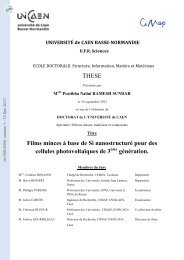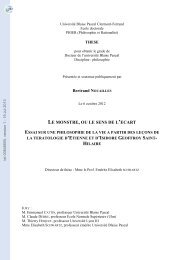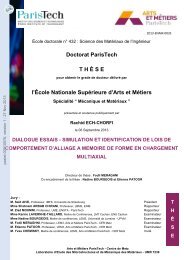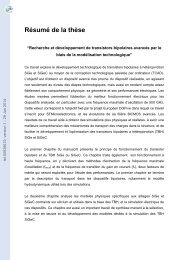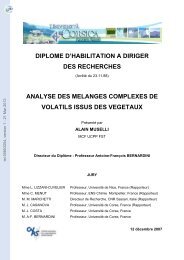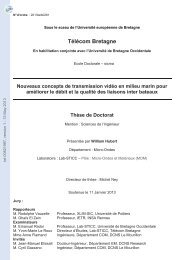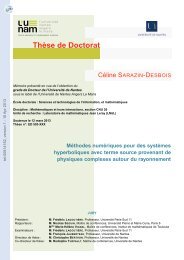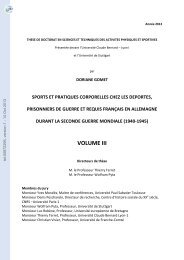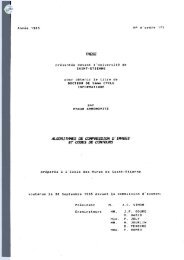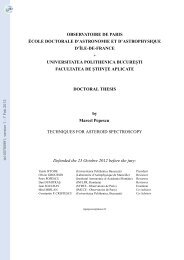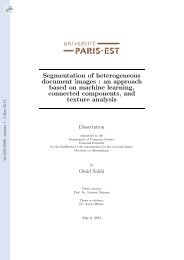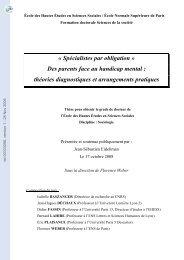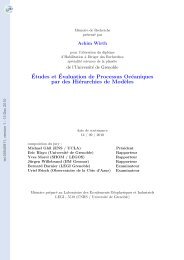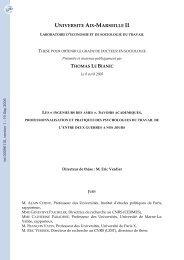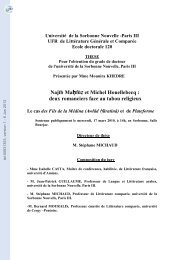tel-00827710, version 1 - 29 May 2013 Altman, J.D., Moss, P.A., Goul<strong>de</strong>r, P.J., Barouch, D.H., McHeyzer-Williams, M.G., Bell, J.I., McMichael, A.J., and Davis, M.M. (1996). Phenotypic analysis of antigen-specific T lymphocytes. Science 274, 94-96. Amigorena, S., and Savina, A. (2010). Intracellular mechanisms of antigen cross presentation in <strong>de</strong>ndritic cells. Curr Opin Immunol 22, 109-117. Annacker, O., Coombes, J.L., Malmstrom, V., Uhlig, H.H., Bourne, T., Johansson-Lindbom, B., Agace, W.W., Parker, C.M., and Powrie, F. (2005). Essential role for CD103 in the T cellmediated regulation of experimental colitis. J Exp Med 202, 1051-1061. Araki, K., Turner, A.P., Shaffer, V.O., Gangappa, S., Keller, S.A., Bachmann, M.F., Larsen, C.P., and Ahmed, R. (2009). mTOR regulates memory CD8 T-cell differentiation. Nature 460, 108-112. Asano, K., Nabeyama, A., Miyake, Y., Qiu, C.H., Kurita, A., Tomura, M., Kanagawa, O., Fujii, S., and Tanaka, M. (2011). CD169-positive macrophages dominate antitumor immunity by crosspresenting <strong>de</strong>ad cell-associated antigens. Immunity 34, 85-95. Badovinac, V.P., Haring, J.S., and Harty, J.T. (2007). Initial T cell receptor transgenic cell precursor frequency dictates critical aspects of the CD8(+) T cell response to infection. Immunity 26, 827-841. Balachandran, V.P., Cavnar, M.J., Zeng, S., Bamboat, Z.M., Ocuin, L.M., Obaid, H., Sorenson, E.C., Popow, R., Ariyan, C., Rossi, F., <strong>et</strong> al. (2011). Imatinib potentiates antitumor T cell responses in gastrointestinal stromal tumor through the inhibition of Ido. Nat Med 17, 1094-1100. Basu, S., Bin<strong>de</strong>r, R.J., Suto, R., An<strong>de</strong>rson, K.M., and Srivastava, P.K. (2000). Necrotic but not apoptotic cell <strong>de</strong>ath releases heat shock proteins, which <strong>de</strong>liver a partial maturation signal to <strong>de</strong>ndritic cells and activate the NF-kappa B pathway. Int Immunol 12, 1539-1546. Bear, A.S., Cruz, C.R., and Foster, A.E. (2011). T cells as vehicles for cancer vaccination. J Biomed Biotechnol 2011, 417403. Bedoui, S., Whitney, P.G., Waithman, J., Eidsmo, L., Wakim, L., Caminschi, I., Allan, R.S., Wojtasiak, M., Shortman, K., Carbone, F.R., <strong>et</strong> al. (2009). Cross-presentation of viral and self antigens by skin-<strong>de</strong>rived CD103+ <strong>de</strong>ndritic cells. Nat Immunol 10, 488-495. Belz, G.T., Smith, C.M., Kleinert, L., Reading, P., Brooks, A., Shortman, K., Carbone, F.R., and Heath, W.R. (2004). Distinct migrating and nonmigrating <strong>de</strong>ndritic cell populations are involved in MHC class I-restricted antigen presentation after lung infection with virus. Proc Natl Acad Sci U S A 101, 8670-8675. Benn<strong>et</strong>t, S.R., Carbone, F.R., Karamalis, F., Flavell, R.A., Miller, J.F., and Heath, W.R. (1998). Help for cytotoxic-T-cell responses is mediated by CD40 signalling. Nature 393, 478- 480. Benn<strong>et</strong>t, S.R., Carbone, F.R., Karamalis, F., Miller, J.F., and Heath, W.R. (1997). Induction of a CD8+ cytotoxic T lymphocyte response by cross-priming requires cognate CD4+ T cell help. J Exp Med 186, 65-70. Berd, D. (2004). M-Vax: an autologous, hapten-modified vaccine for human cancer. Expert Rev Vaccines 3, 521-527. Berger, C., Flowers, M.E., Warren, E.H., and Rid<strong>de</strong>ll, S.R. (2006). Analysis of transgenespecific immune responses that limit the in vivo persistence of adoptively transferred HSV- TK-modified donor T cells after allogeneic hematopoi<strong>et</strong>ic cell transplantation. Blood 107, 2294-2302. 238
tel-00827710, version 1 - 29 May 2013 Beuneu, H., Lemaitre, F., Deguine, J., Moreau, H.D., Bouvier, I., Garcia, Z., Albert, M.L., and Bousso, P. (2010). Visualizing the functional diversification of CD8+ T cell responses in lymph no<strong>de</strong>s. Immunity 33, 412-423. Bevan, M.J., and Fink, P.J. (2001). The CD8 response on autopilot. Nat Immunol 2, 381-382. Biron, C.A. (2001). Interferons alpha and b<strong>et</strong>a as immune regulators--a new look. Immunity 14, 661-664. Blachere, N.E., Morris, H.K., Braun, D., Saklani, H., Di Santo, J.P., Darnell, R.B., and Albert, M.L. (2006). IL-2 is required for the activation of memory CD8+ T cells via antigen crosspresentation. J Immunol 176, 7288-7300. Blan<strong>de</strong>r, J.M., and Medzhitov, R. (2004). Regulation of phagosome maturation by signals from toll-like receptors. Science 304, 1014-1018. Blan<strong>de</strong>r, J.M., and Medzhitov, R. (2006). On regulation of phagosome maturation and antigen presentation. Nat Immunol 7, 1029-1035. Blan<strong>de</strong>r, J.M., and San<strong>de</strong>r, L.E. (2012). Beyond pattern recognition: five immune checkpoints for scaling the microbial threat. Nat Rev Immunol 12, 215-225. Blasius, A.L., and Beutler, B. (2010). Intracellular toll-like receptors. Immunity 32, 305-315. Bogdan, C., Mattner, J., and Schleicher, U. (2004). The role of type I interferons in non-viral infections. Immunol Rev 202, 33-48. Bogdan, C., Moll, H., Solbach, W., and Rollinghoff, M. (1990). Tumor necrosis factor-alpha in combination with interferon-gamma, but not with interleukin 4 activates murine macrophages for elimination of Leishmania major amastigotes. Eur J Immunol 20, 1131- 1135. Bonifaz, L., Bonnyay, D., Mahnke, K., Rivera, M., Nussenzweig, M.C., and Steinman, R.M. (2002). Efficient targ<strong>et</strong>ing of protein antigen to the <strong>de</strong>ndritic cell receptor DEC-205 in the steady state leads to antigen presentation on major histocompatibility complex class I products and peripheral CD8+ T cell tolerance. J Exp Med 196, 1627-1638. Bonifaz, L.C., Bonnyay, D.P., Charalambous, A., Darguste, D.I., Fujii, S., Soares, H., Brimnes, M.K., Moltedo, B., Moran, T.M., and Steinman, R.M. (2004). In vivo targ<strong>et</strong>ing of antigens to maturing <strong>de</strong>ndritic cells via the DEC-205 receptor improves T cell vaccination. J Exp Med 199, 815-824. Bonini, C., Ferrari, G., Verzel<strong>et</strong>ti, S., Servida, P., Zappone, E., Ruggieri, L., Ponzoni, M., Rossini, S., Mavilio, F., Traversari, C., <strong>et</strong> al. (1997). HSV-TK gene transfer into donor lymphocytes for control of allogeneic graft-versus-leukemia. Science 276, 1719-1724. Bougneres, L., Helft, J., Tiwari, S., Vargas, P., Chang, B.H., Chan, L., Campisi, L., Lauvau, G., Hugues, S., Kumar, P., <strong>et</strong> al. (2009). A role for lipid bodies in the cross-presentation of phagocytosed antigens by MHC class I in <strong>de</strong>ndritic cells. Immunity 31, 232-244. Bour, H., Horvath, C., Lurquin, C., Cerottini, J.C., and MacDonald, H.R. (1998). Differential requirement for CD4 help in the <strong>de</strong>velopment of an antigen-specific CD8+ T cell response <strong>de</strong>pending on the route of immunization. J Immunol 160, 5522-5529. Bour-Jordan, H., Esensten, J.H., Martinez-Llor<strong>de</strong>lla, M., Penaranda, C., Stumpf, M., and Bluestone, J.A. (2011). Intrinsic and extrinsic control of peripheral T-cell tolerance by costimulatory molecules of the CD28/ B7 family. Immunol Rev 241, 180-205. Bousso, P., and Albert, M.L. (2010). Signal 0 for gui<strong>de</strong>d priming of CTLs: NKT cells do it too. Nat Immunol 11, 284-286. Page 239 of 256
- Page 1 and 2:
tel-00827710, version 1 - 29 May 20
- Page 3 and 4:
tel-00827710, version 1 - 29 May 20
- Page 5 and 6:
tel-00827710, version 1 - 29 May 20
- Page 7 and 8:
tel-00827710, version 1 - 29 May 20
- Page 9 and 10:
tel-00827710, version 1 - 29 May 20
- Page 11 and 12:
tel-00827710, version 1 - 29 May 20
- Page 13 and 14:
tel-00827710, version 1 - 29 May 20
- Page 15 and 16:
tel-00827710, version 1 - 29 May 20
- Page 17 and 18:
tel-00827710, version 1 - 29 May 20
- Page 19 and 20:
tel-00827710, version 1 - 29 May 20
- Page 21 and 22:
tel-00827710, version 1 - 29 May 20
- Page 23 and 24:
tel-00827710, version 1 - 29 May 20
- Page 25 and 26:
tel-00827710, version 1 - 29 May 20
- Page 27 and 28:
tel-00827710, version 1 - 29 May 20
- Page 29 and 30:
tel-00827710, version 1 - 29 May 20
- Page 31 and 32:
tel-00827710, version 1 - 29 May 20
- Page 33 and 34:
tel-00827710, version 1 - 29 May 20
- Page 35 and 36:
tel-00827710, version 1 - 29 May 20
- Page 37 and 38:
tel-00827710, version 1 - 29 May 20
- Page 39 and 40:
tel-00827710, version 1 - 29 May 20
- Page 41 and 42:
tel-00827710, version 1 - 29 May 20
- Page 43 and 44:
tel-00827710, version 1 - 29 May 20
- Page 45 and 46:
tel-00827710, version 1 - 29 May 20
- Page 47 and 48:
tel-00827710, version 1 - 29 May 20
- Page 49 and 50:
tel-00827710, version 1 - 29 May 20
- Page 51 and 52:
tel-00827710, version 1 - 29 May 20
- Page 53 and 54:
tel-00827710, version 1 - 29 May 20
- Page 55 and 56:
tel-00827710, version 1 - 29 May 20
- Page 57 and 58:
tel-00827710, version 1 - 29 May 20
- Page 59 and 60:
tel-00827710, version 1 - 29 May 20
- Page 61 and 62:
tel-00827710, version 1 - 29 May 20
- Page 63 and 64:
tel-00827710, version 1 - 29 May 20
- Page 65 and 66:
tel-00827710, version 1 - 29 May 20
- Page 67 and 68:
tel-00827710, version 1 - 29 May 20
- Page 69 and 70:
tel-00827710, version 1 - 29 May 20
- Page 71 and 72:
tel-00827710, version 1 - 29 May 20
- Page 73 and 74:
tel-00827710, version 1 - 29 May 20
- Page 75 and 76:
tel-00827710, version 1 - 29 May 20
- Page 77 and 78:
tel-00827710, version 1 - 29 May 20
- Page 79 and 80:
tel-00827710, version 1 - 29 May 20
- Page 81 and 82:
tel-00827710, version 1 - 29 May 20
- Page 83 and 84:
tel-00827710, version 1 - 29 May 20
- Page 85 and 86:
tel-00827710, version 1 - 29 May 20
- Page 87 and 88:
tel-00827710, version 1 - 29 May 20
- Page 89 and 90:
tel-00827710, version 1 - 29 May 20
- Page 91 and 92:
tel-00827710, version 1 - 29 May 20
- Page 93 and 94:
tel-00827710, version 1 - 29 May 20
- Page 95 and 96:
tel-00827710, version 1 - 29 May 20
- Page 97 and 98:
tel-00827710, version 1 - 29 May 20
- Page 99 and 100:
tel-00827710, version 1 - 29 May 20
- Page 101 and 102:
tel-00827710, version 1 - 29 May 20
- Page 103 and 104:
tel-00827710, version 1 - 29 May 20
- Page 105 and 106:
tel-00827710, version 1 - 29 May 20
- Page 107 and 108:
tel-00827710, version 1 - 29 May 20
- Page 109 and 110:
tel-00827710, version 1 - 29 May 20
- Page 111 and 112:
tel-00827710, version 1 - 29 May 20
- Page 113 and 114:
tel-00827710, version 1 - 29 May 20
- Page 115 and 116:
tel-00827710, version 1 - 29 May 20
- Page 117 and 118:
tel-00827710, version 1 - 29 May 20
- Page 119 and 120:
tel-00827710, version 1 - 29 May 20
- Page 121 and 122:
tel-00827710, version 1 - 29 May 20
- Page 123 and 124:
tel-00827710, version 1 - 29 May 20
- Page 125 and 126:
tel-00827710, version 1 - 29 May 20
- Page 127 and 128:
tel-00827710, version 1 - 29 May 20
- Page 129 and 130:
tel-00827710, version 1 - 29 May 20
- Page 131 and 132:
tel-00827710, version 1 - 29 May 20
- Page 133 and 134:
tel-00827710, version 1 - 29 May 20
- Page 135 and 136:
tel-00827710, version 1 - 29 May 20
- Page 137 and 138:
tel-00827710, version 1 - 29 May 20
- Page 139 and 140:
tel-00827710, version 1 - 29 May 20
- Page 141 and 142:
tel-00827710, version 1 - 29 May 20
- Page 143 and 144:
tel-00827710, version 1 - 29 May 20
- Page 145 and 146:
tel-00827710, version 1 - 29 May 20
- Page 147 and 148:
tel-00827710, version 1 - 29 May 20
- Page 149 and 150:
tel-00827710, version 1 - 29 May 20
- Page 151 and 152:
tel-00827710, version 1 - 29 May 20
- Page 153 and 154:
tel-00827710, version 1 - 29 May 20
- Page 155 and 156:
tel-00827710, version 1 - 29 May 20
- Page 157 and 158:
tel-00827710, version 1 - 29 May 20
- Page 159 and 160:
tel-00827710, version 1 - 29 May 20
- Page 161 and 162:
tel-00827710, version 1 - 29 May 20
- Page 163 and 164:
tel-00827710, version 1 - 29 May 20
- Page 165 and 166:
tel-00827710, version 1 - 29 May 20
- Page 167 and 168:
tel-00827710, version 1 - 29 May 20
- Page 169 and 170:
tel-00827710, version 1 - 29 May 20
- Page 171 and 172:
tel-00827710, version 1 - 29 May 20
- Page 173 and 174:
tel-00827710, version 1 - 29 May 20
- Page 175 and 176:
tel-00827710, version 1 - 29 May 20
- Page 177 and 178:
tel-00827710, version 1 - 29 May 20
- Page 179 and 180:
tel-00827710, version 1 - 29 May 20
- Page 181 and 182:
tel-00827710, version 1 - 29 May 20
- Page 183 and 184:
tel-00827710, version 1 - 29 May 20
- Page 185 and 186:
tel-00827710, version 1 - 29 May 20
- Page 187 and 188: tel-00827710, version 1 - 29 May 20
- Page 189 and 190: tel-00827710, version 1 - 29 May 20
- Page 191 and 192: tel-00827710, version 1 - 29 May 20
- Page 193 and 194: tel-00827710, version 1 - 29 May 20
- Page 195 and 196: tel-00827710, version 1 - 29 May 20
- Page 197 and 198: tel-00827710, version 1 - 29 May 20
- Page 199 and 200: tel-00827710, version 1 - 29 May 20
- Page 201 and 202: tel-00827710, version 1 - 29 May 20
- Page 203 and 204: tel-00827710, version 1 - 29 May 20
- Page 205 and 206: tel-00827710, version 1 - 29 May 20
- Page 207 and 208: tel-00827710, version 1 - 29 May 20
- Page 209 and 210: tel-00827710, version 1 - 29 May 20
- Page 211 and 212: tel-00827710, version 1 - 29 May 20
- Page 213 and 214: tel-00827710, version 1 - 29 May 20
- Page 215 and 216: tel-00827710, version 1 - 29 May 20
- Page 217 and 218: tel-00827710, version 1 - 29 May 20
- Page 219 and 220: tel-00827710, version 1 - 29 May 20
- Page 221 and 222: tel-00827710, version 1 - 29 May 20
- Page 223 and 224: tel-00827710, version 1 - 29 May 20
- Page 225 and 226: tel-00827710, version 1 - 29 May 20
- Page 227 and 228: tel-00827710, version 1 - 29 May 20
- Page 229 and 230: tel-00827710, version 1 - 29 May 20
- Page 231 and 232: tel-00827710, version 1 - 29 May 20
- Page 233 and 234: tel-00827710, version 1 - 29 May 20
- Page 235 and 236: tel-00827710, version 1 - 29 May 20
- Page 237: tel-00827710, version 1 - 29 May 20
- Page 241 and 242: tel-00827710, version 1 - 29 May 20
- Page 243 and 244: tel-00827710, version 1 - 29 May 20
- Page 245 and 246: tel-00827710, version 1 - 29 May 20
- Page 247 and 248: tel-00827710, version 1 - 29 May 20
- Page 249 and 250: tel-00827710, version 1 - 29 May 20
- Page 251 and 252: tel-00827710, version 1 - 29 May 20
- Page 253 and 254: tel-00827710, version 1 - 29 May 20
- Page 255 and 256: tel-00827710, version 1 - 29 May 20



